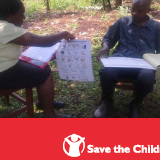
In Uganda, Ministry of Health together with Malaria Consortium is implementing Integrated Community Case Management (ICCM) for the children below five years in nine mid western districts in the country. The Uganda’s ICCM policy does not provide for community-based treatment of newborn illness but rather refer sick newborns to health facilities. However, there exists an information gap as to whether or not danger signs are being correctly identified; to what level families comply with referrals, and whether or not treatment is received at the facility for those who are able to seek care.
This assessment was undertaken to understand how newborn care is being implemented within the ICCM strategy.
Objectives: The purpose of the assessment was to understand newborn care within VHT/iCCM implementation in Uganda; specifically to understand newborn health indicators, effectiveness of the ICCM training and perceptions of stakeholders to the programme.
Methods:The assessment was conducted in three districts of Kiboga, Kyankwazi and Hoima where Malaria Consortium is implementing the iCCM strategy in Uganda. Data was collected through document and records review, structured interviews with 436 Village Health Team (VHT) members, 16 key informant interviews (KIIs) with iCCM program managers, health workers, district malaria focal persons and 9 focus group discussions (FGDs) with caretakers and VHT members. Quantitative data was analysed using STATA version 10 while the qualitative was transcribed and analysed using qualitative content analysis.
Results: Within iCCM programme, relevant newborn indicators are captured particularly the proportional of newborns referred- by gender and presence of danger sign at time of referral in a given period of time. The iCCM training was effective in equipping VHTs with adequate knowledge regarding newborn care: almost all (99%) reported that they refer sick newborns to health facilities as prescribed by iCCM guidelines and about 87% of VHTs were able to mention at least 3 newborn danger signs although not those that reflect severe illness. Health workers, caretakers and VHT members all perceive the iCCM programme as good and beneficial in improving lives of newborns in their communities. The health workers recognize the programme as a very useful strategy for early identification of newborns with danger signs within the communities, including reducing complicated cases of malaria among older children. Caretakers (women and men) appreciate the programme particularly the VHTs’ visits to newborns, identification and referral of sick newborns to health facilities. While the VHTs are of the view that the programme has improved survival of the under 5 children, although with specific expectations such as provision of allowances and incentives to motivate them and continue to provide their services.
Conclusion: ICCM program is highly appreciated by its stakeholders including community, VHTs, health workers and district personnel. The program is perceived to have improved the health outcomes of sick newborns and older children, despite of some challenges. The program has potential to improve newborn survival in communities where it is being implemented.
Recommendation: Ministry of Health and its implementing partners should ensure consistent provision of supplies in a timely manner and consider offering allowances or incentives to the VHTs. Districts should increase awareness of communities about VHTs’ activities. Health workers and communities should support and have positive attitude towards VHT members.